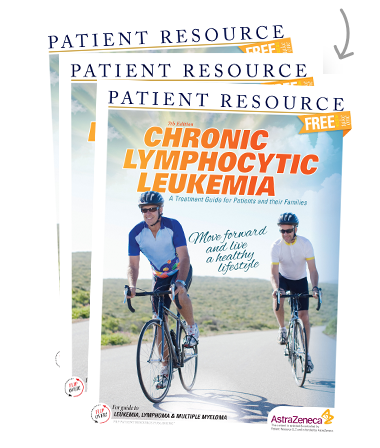Chronic Lymphocytic Leukemia
Medication Adherence
Advancements in CLL treatment have made it possible for many people to undergo treatment from the comfort of home. Oral medications are convenient, offer a sense of normalcy and control, and remove the risk of injection-site or injection-related reactions that intravenous (IV) therapies may bring. However, with these benefits comes the responsibility of correctly following the treatment regimen given by your doctor.
Understanding the importance of correctly taking your medications is critical. Most people do not intend to take their medications incorrectly. They are, however, often uninformed about the possible consequences. For example, a common misconception is that taking multiple doses at the same time will increase its effectiveness. Another is that skipping a dose will lessen side effects or cut down on the cost of treatment. Neither are true. Most drugs are prescribed to be used under certain conditions in order to target your particular diagnosis. Not taking your medication correctly puts you at risk for missing the benefits of the medication. In some cases, it can lead to increased side effects, recurrence, hospitalization or even death.
Before beginning treatment, talk to your doctor about how and when to take your medication. If you feel overwhelmed or confused by your treatment plan, ask your doctor or pharmacist for help. Sometimes your medication can be adjusted to make side effects more tolerable. Or, your medical team can connect you with resources that may make your treatment more affordable. Do not be embarrassed. They work with people every day who have the same concerns.
Remembering to take your medications on time can be difficult. Help keep yourself on track by using medication journals, alarms or smartphone apps. Download a medication tracker at PatientResource.com/CLL_Forms.
Frequently Asked Questions
Q Can I stop taking my medications if I haven’t felt symptoms for several months?
A No. Not having any symptoms indicates the therapy is working. Treating CLL focuses on controlling or maintaining the progression of the disease, which means the medication helps prevent it from worsening or recurring.
Q Side effects from treatment feel worse than the symptoms of CLL. Can I stop the medication to get some relief?
A Talk with your doctor about other therapies. Advances in CLL have led to many treatment options with side effects that you may tolerate better.
Q I cannot afford my treatment. Is it ok if I cut my dose in half to save money?
A Cutting a dosage is never a good idea. Your treatment should be taken the way it is prescribed so it is most effective for you. Many financial and advocacy resources are available that may be able to help. Ask a member of your health care team to connect you with those resources.
Q Can I take more medication than I’ve been prescribed? If the original dose works, a higher dose may work even better.
A This is sometimes called “intentional over-adherence.” Although it might seem to make sense, the dose you’ve been prescribed is designed to be the most effective for you. Higher doses may lead to increased side effects, which may make the health care team believe you cannot tolerate the drug. It may also lead to unnecessary diagnostic tests.
Q I keep forgetting when or if I’ve taken my medication. What can I do?
A It can help to keep a diary of when you take your medication. Download and make copies of My CLL Medication Journal at www.PatientResource.com/CLL_Medication_Journal



